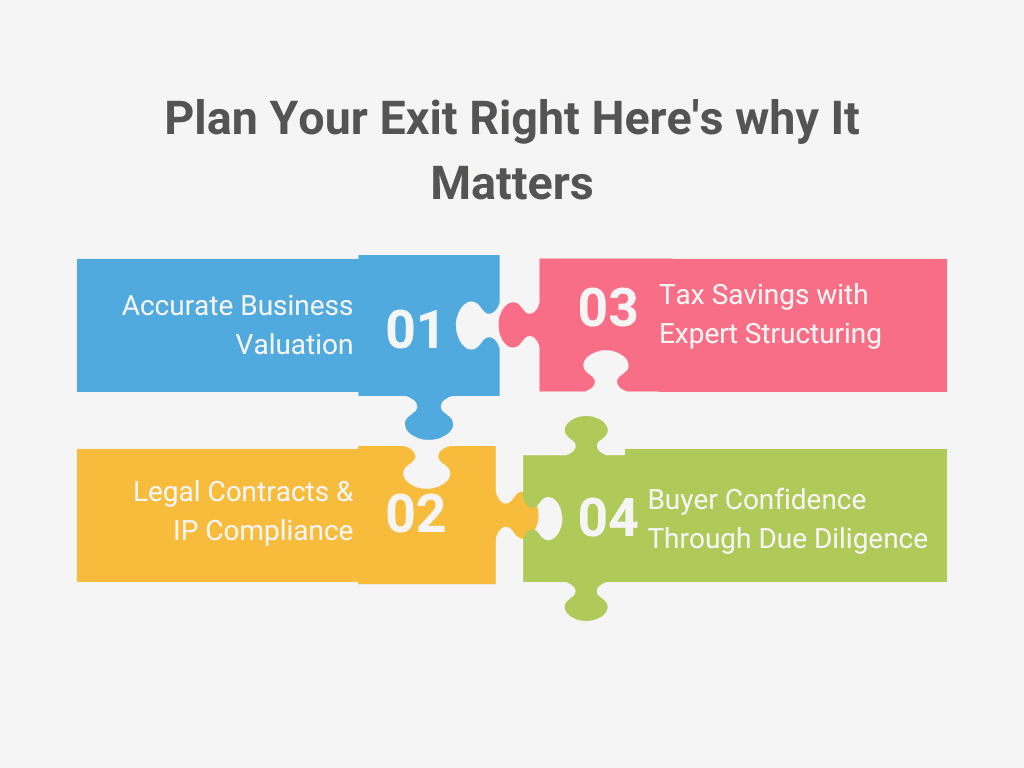Quick Summary:
Exiting a business without a strategy can lead to legal issues, missed tax benefits, and reduced profits. This guide explains how the best legal and financial consultants help entrepreneurs plan and execute a profitable and smooth business exit—through valuation, tax planning, due diligence, and compliance.

Why Every Business Owner Needs an Exit Strategy
Running a business is all-consuming. But no matter how successful you are today, one thing is certain—you won’t run it forever. One day, you’ll exit.
Whether that means selling it, passing it on to family, or closing operations, your business exit should be intentional—not reactive. Yet, most entrepreneurs focus solely on daily operations and delay this essential planning.
That delay can be costly. From poor documentation and legal issues to unexpected taxes, exits without preparation often lead to regret.
This is where the best legal and financial consultants prove invaluable. They help ensure your exit is structured, compliant, and profitable.
What Is a Business Exit Strategy?
A business exit strategy is a structured plan to leave your company—while maximizing value and minimizing legal or financial complications.
📊 “According to the International Business Brokers Association (IBBA), only 20% of small businesses listed for sale actually sell—often due to poor exit planning.”
— Source: ibba.org
A strong exit plan covers everything from ownership transfer and legal contracts to tax planning and asset valuation. It’s especially vital if your business depends heavily on you as the owner.
Common exit options include:
- Selling to a third party
- Family succession
- Management buyout
- Merger or acquisition
- Initial Public Offering (IPO)
- Liquidation
The right path depends on your goals—and the best legal and financial consultants help you identify, structure, and execute that path with clarity.
Legal Compliance for a Smooth Business Exit
Before you think of listing your business for sale or transferring it to a successor, ensure your legal foundation is solid. Any gaps in documentation or compliance can delay—or completely derail—your exit.
Legal Checklist for Business Sale:
✅ Review and restructure your business entity (LLP, Pvt Ltd, sole proprietorship)
✅ Update contracts—with clients, employees, and vendors
✅ Finalize intellectual property rights—ensure patents, trademarks, copyrights are transferable
✅ Draft and formalize succession planning documents
✅ Comply with business succession laws and ownership transfer rules
Legal compliance can make or break a deal. That’s why experienced consultants are key—they make sure everything is airtight before you approach buyers.
Financial Consulting for Business Exits: Clean Books, Higher Profits
The financial side of an exit is where most entrepreneurs feel overwhelmed—and understandably so.
That’s why the best financial consultants step in early to assess and organize your books, accounts, and future projections. Here's how they help:
1. Company Valuation
Valuation determines your business’s fair market worth. Consultants use proven models—like earnings multipliers, discounted cash flow (DCF), and asset-based methods.
2. Financial Hygiene
✔ Eliminate outdated liabilities
✔ Clean up your balance sheet
✔ Reconcile books and records
This improves your credibility and makes due diligence faster.
3. Tax Optimization
Capital gains tax, GST, and transaction costs can eat into your profit. Smart structuring by tax experts helps reduce your liabilities.
Bottom line: Without expert help, you risk overpaying taxes and underpricing your business.
Due Diligence: What Buyers Expect (and How to Prepare)
Once a buyer shows interest, they will want proof. This is due diligence—a deep dive into your legal, financial, and operational history.
You’ll be expected to provide:
- Proof of ownership
- Profit & loss statements
- Tax returns and compliance certificates
- Licenses, leases, and contracts
Debt disclosure and liabilities
📌 “A U.S. Chamber of Commerce study found that companies with incomplete legal or financial documentation take 50% longer to sell—or fail to close altogether.”
— Source: uschamber.com
Good consultants don’t just hand over files. They create organized, audit-ready documentation and respond to buyer queries—ensuring the deal moves fast and doesn’t fall apart.
Choosing the Right Exit Strategy for Your Business
There’s no one-size-fits-all approach to business exit planning. The right strategy depends on your company size, industry, goals, and timing.
Common Strategies
Each of these comes with legal and tax considerations. The best legal and financial consultants help you choose, prepare, and execute the strategy that aligns with your long-term interests.
Mistakes to Avoid in Business Exit Planning
Many exits fall apart because of these avoidable errors:
- Leaving it too late — Start planning 2–5 years in advance
- Underestimating taxes — Capital gains tax and fees can shrink your payout
- Skipping professional help — DIY contracts or valuations lead to bad deals
- Poor documentation — Missing records cause mistrust and delays
- Unrealistic expectations — Inflated valuations scare off buyers
- Emotional decision-making — Let facts and strategy lead
Being aware of these risks—and hiring the right consultants—gives you a significant edge.
Exit Strategy Terms to Know
Why Deutsche Is the Partner You Need
At Deutsche, we understand that business exits aren’t just financial events—they’re emotional, strategic, and legally sensitive.
That’s why our team of the best legal and financial consultants works with you every step of the way:
✅ Valuation services backed by real market data
✅ Contract preparation that protects your interests
✅ Tax planning to optimize post-sale returns
✅ Due diligence support to handle buyer scrutiny
✅ Succession and compliance guidance tailored to your structure
No matter your exit goal—sale, succession, or strategic transfer—Deutsche helps you plan smarter and exit stronger.
Ready to exit your business with confidence?
Start your conversation with Deutsche today. Your legacy deserves expert planning.
